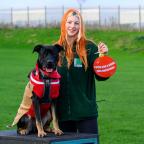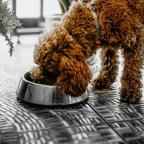
Remote working causing behavioural issues in dogs, says dog training expert
A dog training and behaviour expert has warned owners that working from home could lead to separation anxiety and behaviour issues in their pets unless specific steps are taken to manage it.
Nick Jones MA, who has over two thousand dog behaviour cases behind him, says he has seen a growing trend of behavioural issues in dogs whose owners are working from home.
The dog training and behaviour expert, who has 20 years of experience, partnered with ACME Whistles to help owners overcome the issues which can arise when co-working with a dog.
Over a third of workers in Great Britain now work remotely all or some of the time, whereas before the pandemic, just 4.7% of UK employees worked from home.
Although most dog owners will be delighted to be able to spend more time with their pets, it can lead to them becoming overly dependent on the owner’s company.
A study from the Royal Veterinary College (RVC) found dogs bought during the pandemic have high levels of problem behaviours and a third suffer from separation anxiety.
Separation anxiety is a behavioural condition that can lead to severe issues, including barking and howling, destroying household items and toileting in the house.
Nick said: “Homeworking has become more common since the pandemic and while this has many benefits for employees, I have seen a marked increase in dog behavioural cases relating to separation anxiety.
“The COVID-19 lockdown and the shift towards home working has, in some cases, caused significant behavioural changes in dogs.
“It is vital that dog owners working from home, and spending a lot of time with their pet, are still accustoming them to being alone by following my advice, which includes gradual separation trips and socialising with different people.
“Failing to follow the recommended training could cause your pet to develop destructive tendencies when left alone, including excessive howling, digging and scratching and household damage.”
Nick's top tips for dog owners who work from home to stop behaviour issues from developing:
Gradual separation trips
Leave your dog for short periods and gradually increase the duration of the separations over days, weeks and months. This will accustom it to being alone for sensible periods of time without producing huge feelings of anxiety and will change the dog's emotional response to being left alone over time. Positive distractions, such as leaving a device that can be filled with the dog’s regular meal allowance can help create a positive association when left alone.
Introduce new friends
Involve friends and family members in caring for your dog so it bonds with others and doesn’t rely fully on you. The more people it socialises with, the more relaxed and confident it will become. Doggy daycare is another option to consider as a part of this approach.
Prevent shadowing behaviours
Do not allow your dog to follow you around the house and incorporate regular breaks in the workday when you are away from each other and in different rooms.
Use long-lasting chew and toys
Offer your dog a long-lasting chew, a stuffed Kong, or another distraction like a toy, to encourage it to engage in activities alone, which will work to prevent over-attachment.
Calm greetings
An effective way to reduce separation anxiety is by ensuring calm homecomings and greetings. When you return to your dog after a time, avoid making a fuss or showering your dog with immediate attention. Instead, return quietly and go about your routine for a few minutes before acknowledging your dog. This helps your dog learn that your return is not an overly exciting event, reducing their anticipation and anxiety during your absence. By keeping returns low-key, you reinforce a sense of calm and stability, which is essential for managing separation anxiety.







